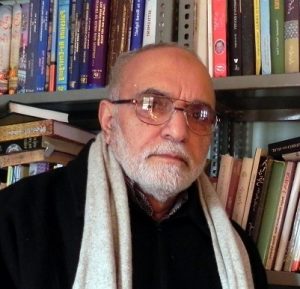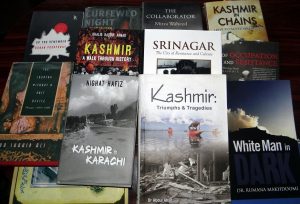Peace Watch » Editor's Take, Kashmir-Talk » Write Your Story- Khalid Bashir Has Written One
Write Your Story- Khalid Bashir Has Written One
PUNCHLINE
Write Your Story
-
Z. G. Muhammad
 Like many other bibliophiles, the iconic bookstore, ‘The Kashmir Bookshop’ on the Residency Road had also become my haunt. Similar to some morning visitors to the India Coffee House, I also had become an avid dust jacket reader inside the bookshop and had developed the habit of flaunting my knowledge about books over a cup of hot coffee. The bookshop by all stretch of the imagination was the only bookstore worth name in the city. Moreover, it often figured on the itinerary of the European and American tourists. On the long shelves stuffed with books on English literature, history, biographies travel, and tourism it was disappointing not to find even a single book authored by a native telling the whole truth about our land. Once champions of ‘freedom of expression had proscribed even some of the books like Josef Korbel’s ‘Danger in Kashmir’ that could provide some insight into the ‘Kashmir Tragedy’’. In this bizarre scenario, it was the ‘dominant discourse’ having found takers in the Coffee House, which had the sway.
Like many other bibliophiles, the iconic bookstore, ‘The Kashmir Bookshop’ on the Residency Road had also become my haunt. Similar to some morning visitors to the India Coffee House, I also had become an avid dust jacket reader inside the bookshop and had developed the habit of flaunting my knowledge about books over a cup of hot coffee. The bookshop by all stretch of the imagination was the only bookstore worth name in the city. Moreover, it often figured on the itinerary of the European and American tourists. On the long shelves stuffed with books on English literature, history, biographies travel, and tourism it was disappointing not to find even a single book authored by a native telling the whole truth about our land. Once champions of ‘freedom of expression had proscribed even some of the books like Josef Korbel’s ‘Danger in Kashmir’ that could provide some insight into the ‘Kashmir Tragedy’’. In this bizarre scenario, it was the ‘dominant discourse’ having found takers in the Coffee House, which had the sway.
That, there were no books authored by writers of the land telling the Kashmir story in the bookstore is not to suggest that there were no writers around those days’ worth their salt. There were many of them but perhaps, they were yet to realize what great Palestine poet Mahmoud Darwish wrote in, a letter from his deathbed: “It is the writer’s responsibility of directly engaging with issues surrounding justice, truth, and freedom. The writer must search for truth and must show what is really happening.”
The scenario of the seventies and the eighties of the past century has metamorphosed- it has radically changed from parched to fertile land. The death of famed, ‘The Kashmir Bookshop’ has given birth to many bookstores on the fashionable Residency Road and its parallel road. Some days back, walking down the Residency Road, I entered into yet another bookstore, the ‘Gulshan Books’ that for its collections had inspired columns from some leading visiting writers including historian Ramachandra Guha and made it to Limca Book of Records- 2018 for having collection of 80000 books in its bookstore on island in the Dal Lake. Lots of books authored by the natives, young and old on the display window and the shelves brought glad tidings- I looked at this changed literary scene as translation into reality of my favorite verse of Mahmoud Darwish, “He who writes his story/ Inherits the land of that Story.” Some brilliant works by our young writers and poets with Kashmir as a theme made me sing in symphony with yet another Palestine poet Fadwa Tuqan, “Our land has a throbbing heart; it doesn’t cease to beat and endures the unendurable.” Every book on the shelves by the native authors is important for the Kashmir narrative – even a single powerful poem or short story can make a difference. One verse of Agha Shahid Ali, “They make a desolation and call it peace’ summed up our story.
From the long catalog on Kashmir, I picked up two books, ‘Kashmir a Walk Through History’ by Khalid Bashir Ahmad and ‘Kashmir to Karachi’ by Nighat Hafiz.’ Gulshan Books has published both these well-brought out hardbound books. I don’t intend to review the books. Nonetheless, the books for their importance to the narrative of Kashmir need to be talked about a bit in detail. Khalid’s book imperceptibly deconstructs the ‘Dominant Discourse’ and Night Hafiz book takes us on a verdant terrain of memoirs that tell the Kashmir story that perhaps would never be said. Kashmir to Karachi, which belongs to a genre of the oral history needs to be talked about in a separate column.
‘Kashmir a Walk Through History’ has seven chapters. It also carries three important appendixes that many contemporary writers have chosen not to include in their works. These include one, memorandum submitted to Maharaja Hari Singh by Maulana Muhammad Yusuf, Mirwaiz Kashmir on language and script controversy, two, letter of the Mirwaiz Kashmir to Prime Minister Gopalaswami Ayyangar sent with the memorandum addressed to Maharaja Hari Singh and report of the high level committee on development of Urdu language in the State of Jammu and Kashmir. The first appendix when reading between the lines and analyzed dispas sionately manifests the hatred that the Urdu suffered during the autocratic rule at the hands of a minuscule minority that joined Sheikh Abdullah’s National Conference. The memorandum presented by the Mirwaiz also exposes the mindset of the bigots who were gearing up for a cultural invasion on the State. For achieving this, they wanted to abolish Arabic, Persian, and Urdu, allot Sanskrit names to places, buildings, associations, and individuals.
sionately manifests the hatred that the Urdu suffered during the autocratic rule at the hands of a minuscule minority that joined Sheikh Abdullah’s National Conference. The memorandum presented by the Mirwaiz also exposes the mindset of the bigots who were gearing up for a cultural invasion on the State. For achieving this, they wanted to abolish Arabic, Persian, and Urdu, allot Sanskrit names to places, buildings, associations, and individuals.
The book is important on two counts, one, it endeavors to connect some missing links in the contemporary history that some early “historians” had purposely chosen not to write about and two, it exposes the 1947 genocide of Muslims in Jammu and documents the same. In October and November, when highly jubilant National Conference had illuminated the city on the appointment of its leader Sheikh Mohammad Abdullah as the Chief Emergency Administrator by Maharaja Hari Singh truckloads of Muslims were slaughtered all over the province by the state. But, not a crow dared to carry the news to Srinagar because of the martial law like the situation in Kashmir and political hoodlums having a field day to gag people through intimidation and terror. It was a couple of European journalist like Ian Stephens of the Statesman who broke the news about this genocide to the world. The reports had suggested that over 250000 Muslims were killed in Jammu and an equal number were coerced to leave their home and hearth and crossover to Pakistan. For fear of the authority from 1947 to 1964, most of the historian had chosen to gloss over this horrible story of the Jammu; it started trickling in bits and pieces after eyewitnesses like Krishen Dev Sethi, Balaraj Puri, and Ved Bhasin began writing and talking about it. Historian Abdul Ahad in his book Kashmir Triumphs and Tragedies published in 2012 by Gulshan Books has dedicated a full chapter to the Jammu Massacre. The chapter Dharam-Yud verses Jihad: A prelude to An Unprecedented Blood recounts the Jammu holocaust and tells us how selective massacre, brutal rape, loot and arson were committed. Khalid Bashir author of the book has dedicated almost a hundred pages of his three hundred page book to this subject and has painstakingly documented the dreadful tales by interviewing witnesses to the massacre.
‘Jinnah and Kashmir’ is another vital subject written in detail in the book. Since 1919, the All India Muslim League at its annual conference had been expressing its concern about Kashmir as against we see the Congress leadership involvement in Kashmir after July 1931 that too on the invitation on Kashmir. Most of the historians have recorded that Jinnah first visited Kashmir in 1936, but Khalid establishes his connect with Kashmir during the 1920s.
The book above everything else will be remembered for documenting the Jammu Massacre.
Filed under: Editor's Take, Kashmir-Talk







